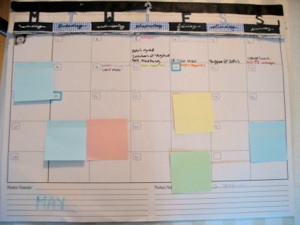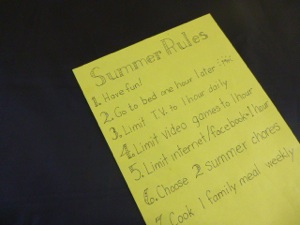Seasons > Special Days > Make the Most of Your Kids’ Summer Vacation
1. Start by Celebrating Their Past Accomplishments
Kids don’t realize how much they have learned and grown, so pointing it out to them can boost their confidence, and make them eager to try new challenges
Make a Portfolio of School Work
Help your child pick 2 or 3 assignments, projects, and/or artwork, etc. that they are proud of, and put them in a notebook. Don’t forget school photos and any awards or certificates they got. Include skills that were mastered outside of school, too. Photos of best friends and favorite outfits, games, toys or pets might be fun, too. Whatever doesn’t fit in a notebook (trophies, plaques, etc.) can be kept in a shoe box (if you call it a time capsule, it will sound a lot cooler.) Let each of your children decorate their own box and notebook. This could be a fun slumber party activity with friends! Help them make timelines of important events and accomplishments for that year, then add to the timeline each year. This can become a great resource for preparing a special celebration when your child graduates from high school, college, and beyond. (Believe me, it is hard to reconstruct events years later) Kids enjoy looking back at what their interests and accomplishments were in the past, so it continues to be a source of encouragement in years to come. They look back over past accomplishments and are reminded of the hard work it took to learn a skill that they now take for granted, and are left with the feeling that they do have achievements to be proud of. We all gain confidence from having our successes acknowledged
Award Ceremony
Make up a fun or quirky award ceremony with a trophy that applauses each child’s attainment. It can be a fun way to celebrate their small accomplishments, particularly things that took a lot of effort for them to achieve, or were not acknowledged by the school or other organizations because they were not outstanding compared to other children. Simply looking over previous years’ school work and having a parent point out how he learned to read, or write in cursive, or do long division can boost his self esteem. He will learn that even though something is hard, if he perseveres, he will learn how to do it.
I am not trying to get you to award everything your child has ever done!! Then the awards are cheapened and have no value at all. If you award a 10 year old for walking or being potty trained, he will laugh in your face. That is what was hard for a one or two year old, not a 10 year old. The awards need to be things that took a lot of effort, and the child himself will feel proud about his own accomplishments once they are pointed out.
Plastic trophies are sometimes sold at dollar stores, or party goods stores. Medals are sometimes sold in dollar stores, or you can make them out of ribbon and buttons or chocolate “gold coins.” Other awards could be certificates printed on your computer, or plaques with the certificate mounted on a piece of wood.
“I Survived” Award
Whether it was suffering under an unsympathetic teacher, or being bullied, or nearly flunking chemistry, this is a good way to teach them that when they face a challenge or difficulty, it doesn’t have to ruin their lives. They can rise above and overcome. They can learn to laugh at themselves and find strength in the emotional encouragement they get from family and friends.
Keep this light and funny. The award itself can be any silly award you can think of --a greenie-weenie award for worst teacher ever, or let your child design a T-shirt declaring she survived chemistry, or even a book burning ceremony might give your child emotional closure for a difficult chapter in her life.
If your child has had to face a particularly difficult situation during the past year, there is potential to become demoralized, or fearful to try again. Your input can make the difference between whether they put the pain and disappointment behind them and move forward, or wallow in self pity and are paralyzed by fear. You are the best one to help them be resilient and to learn from their mistakes, and build on it for future success. You can teach them that when life knocks them for a loop, they can take it as a challenge to overcome in that area, or choose a different area to excel in. Telling stories of overcoming difficulties in your own life can be an amazing encouragement. Books from the library about kids overcoming difficulties can help, too.
Brainstorm New Skills to Learn
It may be hard for kids to come up with goals if they don’t even know what the options are. Help them out by making lists of skills in different categories for them to choose from. Their goals don’t have to be limited to these, but it will give them ideas to get started. It also gives you a chance to plant seeds for things you intend to teach them anyway. Whether it is learning to play the guitar or drums, how to use wood working tools or baking, play basketball or tennis, calligraphy or art, whatever your children’s interests are, try to figure out a way for your children to gain skill in that area of interest. If you don’t know how to teach it, you might be able to find a relative, church member, or neighbor who might be willing to mentor a young person. Sometimes there are community classes that you could enroll them in. If you do nothing else, at least go to the library and check out some books or how-to videos, and learn the new skill together with your child.
This is a good time to introduce your goals for your children as well. There are SO MANY skills they need to learn before they go off to college--cooking, cleaning, laundry, house repair, yard work, etc., etc.
If you have no idea about what might be important to teach your children or what age to teach them, buy this book shown on the left, 401 Ways to Get Your Kids to Work at Home. It takes all the hard work out of trying to figure out what to teach when, since it has different household tasks broken down by the age that they can be expected to do these. If your kids object to learning these things, explain that it is part of growing up, and they need to learn these skills as preparation for becoming adults. Letting them choose from several options might help them embrace it, too. Also, limiting certain skills to ages, can add a “coming of age” element that makes them WANT to advance to the next level.
Make Individual Plans and a Master Family Plan
Once the new skills have been decided, help each child make a chart for getting things done. Include house chores, and your goals for them, too. If their school has a summer reading program, make deadlines for reading each book so they don’t end up trying to read all 5 books the last week of summer. They may not think of learning to cook, but it is one of those skill you need to make sure they learn! Summer is a convenient time to teach--with a new technique each summer. Their charts should help them break goals down into smaller steps, and include columns to mark dates as they get completed. These charts are going to be worthless if you don’t review them weekly with your child to help them keep track of their progress. If they miss deadlines, this becomes a teaching point--you don’t give up over one failure--you make a more realistic goal, and keep working at it!
Next, make a master plan for the whole family. Make or buy a large calendar and fill in all the known dates. Some of the things you might want to include would be going to a week of summer camp, the family vacation, visiting grandparents, birthdays, and an end of the summer sleepover with friends for that last week of summer. Including fun things as well as hard things makes it easier for the kids to accept. If there is room, you can include individual’s goals--give them each post-it-notes to fill in their individual goals so that they can be moved around as need be. Using a different color for each child can help keep track of it all, too.
Plan the Family’s Vacation
If you get your children involved in planning and executing the family vacation, they will learn SO many skills: How to research information on line, how to make and keep a budget, how to read a map, how to make reservations, how to make those hard choices between whether to spend one day at an amusement park or a whole week camping. If they choose camping, they can learn a whole slew of survival skills, like how to pitch a tent, make a fire, and cook over a fire. Each year you can add a new responsibility since they can’t learn it all in one vacation. After a few years, they will become pros!
I am NOT saying that you should let them make all the decisions--you are still the parent and should have the final say. But involving them in some of the choices and planning will help them learn a lot!!! It might even reduce some of the begging or complaining, since they have made some of the decisions.
2. Help your Kids Plan Their Own Summer
Your children will learn so many life skills, including goal setting, breaking goals down into doable steps, and setting deadlines. Keep it fun, and your kids will accomplish much, and gain self confidence--make it boring or too hard, and it will feel like pulling out toenails!
Seasons > Special Days > Get the most out of your kids’ Summer Vacation
Make Summer Rules
You may choose to relax some rules, but don’t throw them all out! You will probably want to include some rules for limiting T.V. time and video game time. If you don’t limit these, you can forget about your children accomplishing any of those goals!!
One way to introduce new summer rules is to start with things they will be excited about, like a later bedtime, or pizza once a week. Another way to get your kids to agree to these rules is to have a family meeting to decide the rules together. Obviously you are the parent, so you make the final decisions about what stays or goes.
The best way to make sure everyone follows the rules is to make corresponding consequences. If they break rules, or don’t do a chore adequately, take away privileges such as T.V. time, computer time, later bedtime, etc. Be consistent, and you should have no trouble getting them to follow all the rules.
Require Responsibility
Summer may be vacation from school, but the family has to keep running year round--they all should be expected to carry their share of the load. Help them understand this by suggesting that Mom takes the summer off from cooking--they will not like that idea at all!! Do not let your children shirk these responsibilities over the summer. Actually, they should have more responsibilities in the summer since they have so much free time! Don’t feel bad about this at all--they will not learn to take responsibility if they always have things done for them.
When they see that everyone is relying on them, they will step up to the challenge. For example, if they understand that everyone will go hungry if they don’t make the evening meal, they know they can’t shirk that responsibility. The bonus is that once they tackle some of these new responsibilities, they also become much more grateful when they realize how much work Mom and Dad do for them everyday, AND they will feel more confident from achieving these new skills, not to mention how much more prepared they will be for living on their own!
Encourage Employment
There are so many valuable life lessons to be learned from work-- doing a job well (the work has to be re-done or not paid if not to standard), time management (they can dilly-dally all afternoon, or finish the job quickly and have the rest of the afternoon to play), not to mention learning to value time and money (if they have to work all day to get money, they will use it more carefully than if they are handed the money with no effort.)
If working for money is not possible outside the home, at the very least, you can have a list of jobs that your children can do around your home that you will pay them for doing. Below are some services neighbors might be willing to pay for.
-
1.Weeding
-
2.Mowing lawns
-
3.Washing windows
-
4.Cleaning houses
-
5.Babysitting
-
6.Washing cars
-
7.Walking dogs
-
8.Baking cookies








Watch T.V for hours everyday
Play video games for hours
Get bored and get into trouble
Learn how to play the guitar
Learn how to bake a cake
Read 10 books
Help plan the family vacation
Make money mowing lawns or babysitting
Which would you prefer for your children’s summer vacation to look like?
The left side may initially look more attractive because it requires no effort from the parents. However, if you are willing to work on it, you can use summers to prepare your kids to be thriving, knowledgable adults, and more importantly, self confident adults, because the more skills and know-how they have, the more confident they will become. Don’t rush into it, though: FIRST give them a week of summer bliss or you may end up with mutiny on your hands! Then how you introduce it matters--here are a few ideas that can help you get started in the right direction.


This is where mastering a new skill can make a huge difference in helping them gain self confidence--they know they can excel in one area, even if they struggle in other areas.





